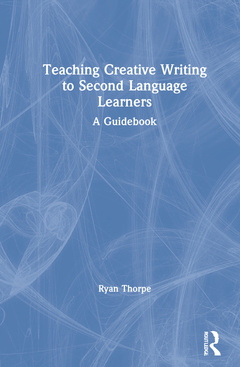Teaching Creative Writing to Second Language Learners A Guidebook
Auteur : Thorpe Ryan

This timely and accessible book offers engaging guidance to teachers of second language students on teaching creative writing in their classrooms. Creative writing is a tool that can inspire second language learners to write more, play with language, and enjoy and improve not only their writing, but also their speaking, listening, and reading skills. Addressing the expectations and perceptions of writing in another language, Thorpe demonstrates how to foster successful creative writing environments and teach and assess creative writing in a way that is tailored to the distinct needs of non-native speakers. Covering key topics such as cultural storytelling, voice, genre, and digital composition, assessment, and more, Thorpe shares successful creative writing instructional practices informed by current research in creative writing and second language education. Each chapter includes insights, advice, and student examples that can help new teachers take their first steps in more reflective second language creative writing classroom.
An invaluable resource for instructors of non-native students and an ideal text for pre-service teachers in courses in TESOL, writing instruction, and applied linguistics, this book invites you to use creative writing not only as a successful method for teaching L2 writing, but also as a way to improve student motivation and output, for more effective language learning.
Preface
Chapter 1. Introduction to Creative Writing in ESL
Chapter 2. Expectations and Perceptions
Chapter 3. Research in Creative Writing
Chapter 4. The Workshop and Other Options
Chapter 5. Using Literature
Chapter 6. Intercultural Storytelling
Chapter 7. Brainstorming
Chapter 8. Characters
Chapter 9. Conflict
Chapter 10. Setting
Chapter 11. Dialogue
Chapter 12. Word Choice
Chapter 13. Endings
Chapter 14. Developing Voice
Chapter 15. Working with Genre
Chapter 16. Digital Composition
Chapter 17. Responding to Creative Writing
Chapter 18. Editing
Chapter 19. Grading Creative Writing
Chapter 20. Final Thoughts
Ryan Thorpe is Associate Teaching Professor at the University of Michigan-Shanghai Jiao Tong University Joint Institute, Shanghai, China.
Date de parution : 12-2021
15.2x22.9 cm
Date de parution : 12-2021
15.2x22.9 cm
Thèmes de Teaching Creative Writing to Second Language Learners :
Mots-clés :
Chen Min; Creative Writing; TESOL; Creative Writing Instructor; ELL; Creative Writing Classroom; classroom; Creative Writing Class; language; Peter Elbow; foreign languages; ESL Classroom; language use; Wendy Bishop; creativity in language teaching; Writing Center Theory; Creative Writing Teaching; Language Academic Writing; Non-native English Teachers; Creative Writing Workshops; ESL Write; Key Words; Writing Center; Native Language Users; Academic Writing Assignments; Fan Fiction Website; Traditional Workshop; Raindrops; Young Man; Intercultural Rhetoric; Inflected Past Tense Verbs; Contrastive Rhetoric
